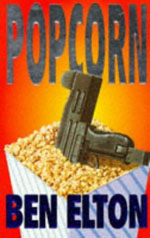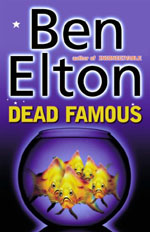Ben Elton: Popcorn & Dead Famous
A look at two of Ben Elton's most popular novels.
 Title Popcorn
Title Popcorn
Released August 5, 1996 (Hardcover)
Publisher Simon & Schuster Ltd
ISBN: 0684816121
Popcorn features a movie director who ends up rather hoist by his own petard. After he goes through the media circus of justifying the ultra-violence in his new movie, due to be a Hollywood blockbuster, he finds himself face-to-barrel with a couple who appear to have taken him literally. Fresh (well, sort of) from a killing spree across the US, the Clyde of the couple, Wayne, demands that the director, Bruce, blame their actions on his movies, live on national TV, and give his newly-won Oscar back. Or else.
Through the stand-off in Bruce's perfect Hollywood house, Elton debates the role the media plays in defining acceptable boundaries for society, and just who is responsible when some members of that society kill others. According to Wayne, he is 'the exploitably ill', and so Bruce is responsible for exploiting his illness by encouraging his violent tendencies. When threatened by the police during the broadcast, Wayne turns the responsibility for his behaviour onto the viewing public with the power of a ratings computer, threatening to kill everyone in the house unless they switch off their TVs...
Popcorn explores some interesting ideas, and the conclusion of the book made me smile, but the essential problem is that the reader cannot help but feel that we've been here before. Obviously, there's no shortage of pressure groups filled with grieving people looking for some explanation of the particular tragic incident that affected them, and we certainly aren't going to see the formation of 'Mothers Against Acting Like Self-Appointed Moral Guardians', so Elton's message is still timely. However, the role of the media in supposedly influencing murderers was dealt with in 'Natural Born Killers', so the bite of Elton's satire is dulled somewhat, which makes the book less enjoyable than it should be.
Nevertheless, this is still a compelling story, told with the odd lapse into movie script, which enhances the visual images in the reader's head and keeps the tension going. Elton also puts some cracking dialogue into Wayne's mouth, making him by far the most interesting character: "It's an electronic democracy. There ain't no 'you' and 'us' any more because 'us' is in your face every day. Appearing on your game shows. Caught on video, robbing your banks. Confessing our sins on Oprah, 'n' getting them forgiven on the Inspiration Channel. People are television, man, and you're asking me how I know how to use it?".
 Title Dead Famous
Title Dead Famous
Released November 5, 2001 (Hardcover)
Publisher Bantam Press
ISBN: 0593048040
Ah, the Elton. Reviled by many for his musicals, his reputation has suffered among those who think they know what his best work is. Frankly, I wouldn't mind guessing that Ben's coining it in far too much to care. However, regardless of whether you'd prefer a night in with 'Filthy, Rich and Catflap' rather than going to see 'We Will Rock You', you'd be foolish to dismiss Ben's novels, which continue his love of themed stories first established in his stand up.
'Dead Famous' is an engaging whodunnit against the backdrop of a reality show inspired by Big Brother. Elton actually thanks the contestants of several Big Brothers at the start of the book, and those who follow such shows will probably see elements of all the contestants in the characters. As you are probably not surprised to hear, the book does not pat the format on the back, but, on the other hand, doesn't get bogged down in criticism either. Through the actions of the slightly megalomaniac producer, Geraldine, Ben raises important questions of why we watch such programmes, and why people subject themselves to the highly selective eye of the programme. The cult of the celebrity, which sells so many magazines, is examined through the contestants' experiences, and the morals of everyone involved, including the public, are explored. It's not moralising on the effect of alcohol on a bored group of attention-seekers, though: the characters are given real depth, although it's not generally intellectual. A particularly interesting side plot focuses on the fine line between casual petting and sexual assault, something which could be used to great effect in discussions with teenagers, the age group most at risk of this tricky situation. Ben's writing is so intense that it almost leads us too far, and then slaps us round the face with the unpleasant consequences of a single-minded pursuit of the particular goal concerned. The experience of Makosi in the last Big Brother makes this incident curiously prescient.
The events in the house are interspersed with the police investigation of the murder in the house, abandoning chapter points with 'days', a clever device which leads us to where the two stories merge into one, by which point we know more about the contestants than the public. Ben doesn't let us into the identity of the victim until this stage, which encourages us to watch ever closer for signs of motivation. Having kept us guessing with the maelstrom of contestants' weaknesses, tantrums and plotting, the actual revelation of the murderer almost serves as a comedown, and I didn't guess who it was until Ben wanted me to.
The cost of a short-cut to fame is ruthlessly explored in this book, and it is to Elton's credit that he doesn't drown in tedious moralising, but raises important questions of the consequences of the goal of celebrity, and the responsibility of both the public and the media to avoid a sad, tragic section of people rejected for simply not looking good in the final edit.
About this entry
- By Tanya Jones
- Posted on Saturday, March 04 2006 @ 10:21 pm
- Categorised in Books
- 1 comment

Much as I hate what Ben Elton has become these days... I absolutely adore Dead Famous. Past Mortem is good too, for different reasons; but Dead Famous is an absolute riot.
By Seb
March 04, 2006 @ 11:32 pm
reply / #